Hyundai i30 vs MG HS/EHS – Which model is better for everyday use?
Two cars, one duel: Hyundai i30 meets MG HS/EHS.
Which one wins in performance, efficiency and value for money? Find out now!
Costs and Efficiency:
Price and efficiency are often the first things buyers look at. Here it becomes clear which model has the long-term edge – whether at the pump, the plug, or in purchase price.
Both models are evenly matched in price – each starts at 24000 £.
Fuel consumption also shows a difference: MG HS/EHS manages with 0.50 L and is therefore decisively more efficient than the Hyundai i30 with 5.70 L. The difference is about 5.20 L per 100 km.
Engine and Performance:
Power, torque and acceleration are the classic benchmarks for car enthusiasts – and here, some clear differences start to show.
When it comes to engine power, the MG HS/EHS has a convincingly edge – offering 272 HP compared to 140 HP. That’s roughly 132 HP more horsepower.
In acceleration from 0 to 100 km/h, the MG HS/EHS is clearly quicker – completing the sprint in 6.80 s, while the Hyundai i30 takes 9.60 s. That’s about 2.80 s faster.
In terms of top speed, the Hyundai i30 performs barely noticeable better – reaching 197 km/h, while the MG HS/EHS tops out at 195 km/h. The difference is around 2 km/h.
There’s also a difference in torque: MG HS/EHS pulls distinct stronger with 350 Nm compared to 253 Nm. That’s about 97 Nm difference.
Space and Everyday Use:
Whether family car or daily driver – which one offers more room, flexibility and comfort?
Both vehicles offer seating for 5 people.
In curb weight, Hyundai i30 is noticeable lighter – 1291 kg compared to 1625 kg. The difference is around 334 kg.
In terms of boot space, the MG HS/EHS offers evident more room – 507 L compared to 395 L. That’s a difference of about 112 L.
In maximum load capacity, the MG HS/EHS performs slightly better – up to 1484 L, which is about 183 L more than the Hyundai i30.
When it comes to payload, Hyundai i30 distinct takes the win – 509 kg compared to 400 kg. That’s a difference of about 109 kg.
Who comes out on top?
Overall, the MG HS/EHS shows itself to be wins the duel decisively and secures the title of DriveDuel Champion.
It convinces with the more balanced overall package and proves to be the more versatile choice for everyday use.
MG HS/EHS
Hyundai i30
The Hyundai i30 stands out in the hatchback segment with its sleek design and modern features. It offers a comfortable ride with a well-crafted interior that caters to both driver and passengers. With its emphasis on safety and technology, the i30 provides a balanced driving experience suitable for urban and suburban environments.
details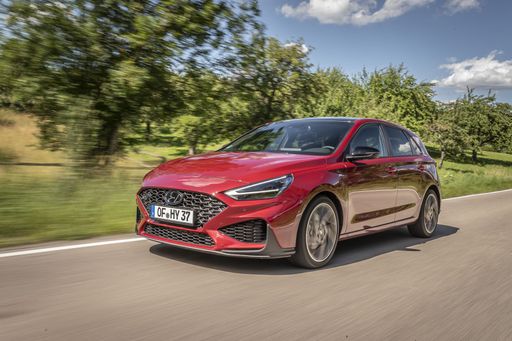 @ hyundai.news
@ hyundai.news
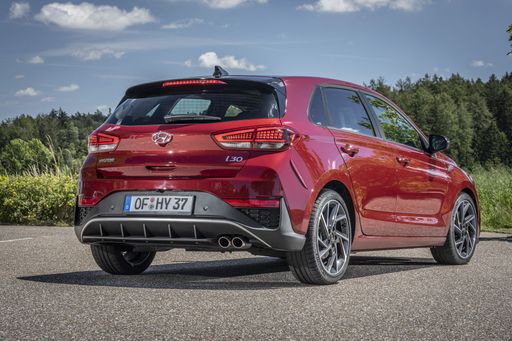 @ hyundai.news
@ hyundai.news
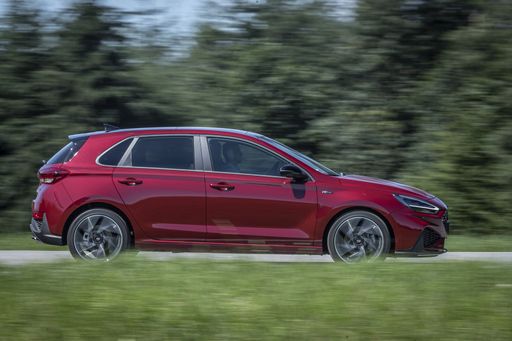 @ hyundai.news
@ hyundai.news
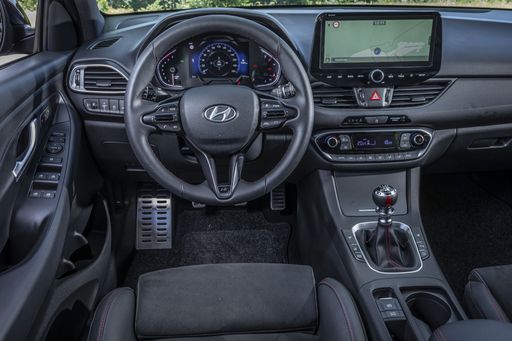 @ hyundai.news
@ hyundai.news
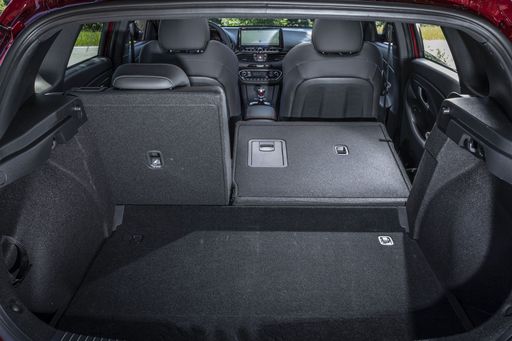 @ hyundai.news
@ hyundai.news
MG HS/EHS
The MG HS, also known as the EHS in its hybrid variant, is a midsize SUV that combines modern design with a focus on comfort and technology. Its spacious interior offers a premium feel, enhanced by quality materials and an array of advanced features aimed at ensuring a smooth driving experience. Known for its efficiency, the MG HS/EHS delivers an enjoyable ride whether navigating city streets or taking on longer road trips.
details

|
|
|
|
|
Costs and Consumption |
|
|---|---|
|
Price
24000 - 29300 £
|
Price
24000 - 36000 £
|
|
Consumption L/100km
5.7 - 6 L
|
Consumption L/100km
0.5 - 7.6 L
|
|
Consumption kWh/100km
-
|
Consumption kWh/100km
-
|
|
Electric Range
-
|
Electric Range
100 km
|
|
Battery Capacity
-
|
Battery Capacity
-
|
|
co2
130 - 136 g/km
|
co2
14 - 173 g/km
|
|
Fuel tank capacity
50 L
|
Fuel tank capacity
55 L
|
Dimensions and Body |
|
|---|---|
|
Body Type
Hatchback
|
Body Type
SUV
|
|
Seats
5
|
Seats
5
|
|
Doors
5
|
Doors
5
|
|
Curb weight
1291 - 1407 kg
|
Curb weight
1625 - 1930 kg
|
|
Trunk capacity
395 L
|
Trunk capacity
441 - 507 L
|
|
Length
4340 mm
|
Length
4655 - 4670 mm
|
|
Width
1795 mm
|
Width
1890 mm
|
|
Height
1455 mm
|
Height
1663 - 1664 mm
|
|
Max trunk capacity
1301 L
|
Max trunk capacity
1291 - 1484 L
|
|
Payload
463 - 509 kg
|
Payload
400 kg
|
Engine and Performance |
|
|---|---|
|
Engine Type
Petrol, Petrol MHEV
|
Engine Type
Petrol, Plugin Hybrid, Full Hybrid
|
|
Transmission
Manuel, Automatic
|
Transmission
Manuel, Automatic
|
|
Transmission Detail
Manual Gearbox, Dual-Clutch Automatic
|
Transmission Detail
Manual Gearbox, Dual-Clutch Automatic, Automatic Gearbox
|
|
Drive Type
Front-Wheel Drive
|
Drive Type
Front-Wheel Drive
|
|
Power HP
100 - 140 HP
|
Power HP
170 - 272 HP
|
|
Acceleration 0-100km/h
9.6 - 13.1 s
|
Acceleration 0-100km/h
6.8 - 9.6 s
|
|
Max Speed
178 - 197 km/h
|
Max Speed
190 - 195 km/h
|
|
Torque
172 - 253 Nm
|
Torque
275 - 350 Nm
|
|
Number of Cylinders
3 - 4
|
Number of Cylinders
4
|
|
Power kW
74 - 103 kW
|
Power kW
125 - 200 kW
|
|
Engine capacity
998 - 1482 cm3
|
Engine capacity
1496 cm3
|
General |
|
|---|---|
|
Model Year
2024
|
Model Year
2024 - 2025
|
|
CO2 Efficiency Class
D, E
|
CO2 Efficiency Class
F, B, D
|
|
Brand
Hyundai
|
Brand
MG
|
What drive types are available for the Hyundai i30?
Available configurations include Front-Wheel Drive.
The prices and data displayed are estimates based on German list prices and may vary by country. This information is not legally binding.
